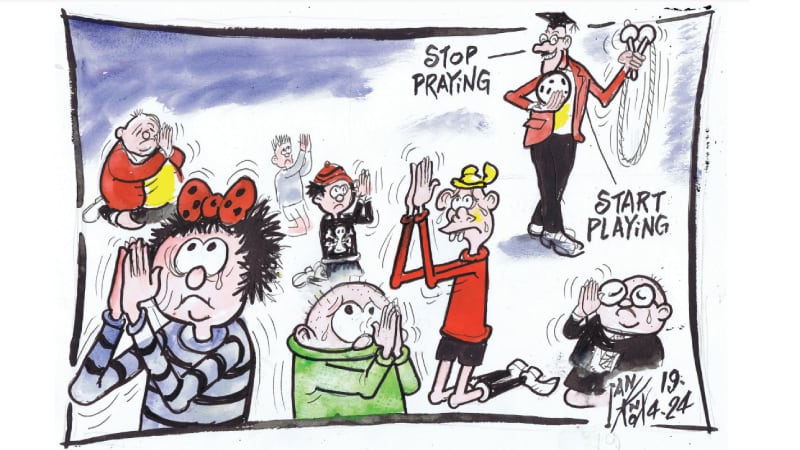The furore caused by Arlene Foster’s indecorous take on a rival in the political arena should come as no surprise. Her cack-handed approach at being courteous and civil only affirms the perception held by many that not only is she unrepentant and bereft of remorse but lacks any form of atonement.
After her interview with a Sunday newspaper where she loudly and proudly exclaims “I will never forgive or forget” referring to an injustice visited upon her, she insists her remarks concerning Michelle O’Neill were intended as a ‘compliment’. However, this surely seems implausible.
Mrs Foster’s fascinating behaviour looks to have no end. She appears to have no concept of the power her words and phrases carry. After demonising Gerry Adams as an anthropomorphic being with a ‘radical republican agenda’ in the March assembly election – a ploy that went disastrously wrong – she now curiously carries an obsession about the man. On being asked to describe him she dithers “he has a very strange personality” and “he is not someone who she understands very well, he is not in my circle of friends”.
Perhaps she will come to realise a change in strategy is needed and has accepted he is a man in his sixties with grey hair and a grey beard who has rubbed shoulders with the future King of England.
KEVIN McCANN
Belfast BT1
Many make the basic mistake ‘of reading history backwards’
Eamonn MacGrianna (May 9) in pursuit of his delusion that the SDLP is somehow a unionist party demonstrates his lack of knowledge of Irish history.
From its foundation – August 17 1970 – the SDLP defined one of its primary aims as: ‘to promote cooperation, friendship and understanding between north and south with the view to the eventual reunification of Ireland through the consent of the majority of the people in the north and in the south’.
As John Hume never tired of saying, the land of Ireland is already united, it is the people who are divided. The SDLP core aim has been fully incorporated into the 1998 Good Friday Agreement, which was endorsed by the overwhelming majority of the people on this island.
In 1984, the New Ireland Forum Report, which was the considered view of the democratic nationalist parties in Ireland at the time, including the SDLP, was happy to endorse three possible alternative structures for a New Ireland. These were – a unitary state, a federal/confederal state or joint authority. The SDLP is open to a federal Ireland if that is what the Irish people choose.
It is certainly true than neither Daniel O’Connell nor Charles Stewart Parnell were Irish republicans and it is also true that both were absolutely opposed to violence. O’Connell had seen too much bloodshed during the French Revolution and,contrary to what Eamonn implies, Parnell was no ‘sneaking regarder’ and, both in public and private, was absolutely consistent in his opposition.
Eamonn makes the basic mistake of ‘reading history backwards’ and Irish history is replete with our ‘heroes’ holding views which are unpalatable to us today. For example:
Wolfe Tone, the father of Irish republicanism, tried to persuade Pitt the Younger to help him colonise present day Hawaii under British rule
John Mitchel and many of the north American Fenians were firm advocates of slavery and supported the US Confederacy (whereas O’Connell was honourably opposed to slavery in all circumstances)
one of Parnell’s biggest financial backers was the British arch-imperialist himself, Cecil Rhodes, who was happy that white supremacy be maintained when Parnell promised he would not withdraw his MPs from Westminster in the event of
Home Rule
In relation to the ‘mandate’ that Sinn Féin received in 1918. I’ve got news for Eamonn – everyone who voted in 1918 is long since dead. Anyway the ‘mandate’ of the 476,087 people who voted for Sinn Féin in 1918 has been dwarfed by the 2,219,549 people who endorsed the Good Friday Agreement in 1998.
In the aftermath of Brexit, Irish unity is on the agenda in an unprecedented way. However, it has to be planned for, advocated with generosity and as John Hume so often said, it is fundamentally a matter of those who believe in it peacefully persuading those who do not believe in it.
EAMON HANNA
Belfast BT9
Robert’s blinkered dispensation
Robert Sullivan makes three main points (April 28) – remainers in Ireland ‘all appear to be the rich’; the EU is associated with an erosion of workers’ rights and Ireland should ‘go it alone’ by ‘hooking up with the UK’. As usual, each point is wrong and illogical.
The majority of Irish remainers were northern nationalists. Many of those live west of the Bann and in border areas. These are officially described by even the NI administration as ‘less favoured areas’ with low wages. The leave camp in Britain was led by well-known pauper and man of the people Boris Johnson and their media campaign was indirectly assisted by Nigel Farage’s mate, right-wing billionaire Robert Mercer who ‘informally’ assisted the Leave campaign.
Post-Brexit, in addition to jettisoning consumer standards in order to strike a trade deal with the likes of the US – and Britain will have to wait until the US has first concluded a deal with the EU – Britain also is planning a final assault on workers’ rights, according to a recent TUC report.
How exactly does ‘hooking up with the UK’ equate to ‘going it alone’? In Robert’s blinkered dispensation, Ireland is a perennial British appendage and can never hope to be more than the British organ-grinder’s monkey.
SEAN MacCANN
Trillick, Co Tyrone
Frightening abuse statistics
Almost 3,000 domestic abuse incidents were recorded in north Belfast alone last year – an increase of more than 300 on the previous year’s figures.
These are truly frightening statistics. North Belfast now sits at the top of the domestic abuse table. That is not a record to be proud of.
Domestic abuse incidents cover a range of offences but instances of violence against the person figure all too highly.
I am also very concerned that cuts to housing and other benefits will make it even more difficult for some women to escape abusive relationships.
It is surely now time to formally include relationship guidance as a subject in schools. We cannot go on year after year witnessing increasing incidents of domestic abuse without taking some affirmative action.
GEMMA WEIR
Workers Party, North Belfast
‘Different’ kind of killing
I am just after reading Maurice Fitzgerald’s letter (May 16) in it he is highly critical of Sinn Féin’s ongoing homage to dead IRA volunteers. Now maybe I am wrong but I can not recall his letter last year when he was as critical of F/F, F/G and all other Free State parties when they where paying homage to the men and women of 1916.
Sorry if I am wrong and maybe the letter could be reprinted to remind me, but did the men and women of 1916 and onward not also deal in death, destruction and conflict? Was that a ‘different’ kind of killing?
PETER CORRIGAN
Dungannon, Co Tyrone








